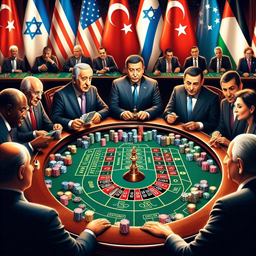By Ron Raskin

The first Gaza War is over. Its ending was almost as surprising as its beginning. Everyone knew that it should happen one day, but no one really believed it would.
Just like two years ago—when Israel’s eyes were wide shut to see who they were really dealing with—many people today prefer to believe what they want to believe: that the war is over, the hostages are back, Hamas is defeated, and it will either be disarmed or unable to threaten Israel again for many years.
But while Israel and its allies celebrate victory, Hamas is celebrating too—and so are Turkey, Egypt, and Qatar. Anyone honest with themselves has to ask: why? Why are those who spread hatred toward Israel so pleased with the outcome?
The answer lies in understanding that this “peace deal” is really a gamble. Each side agreed to stop fighting, hoping reality will move in the direction they want. This allows everyone to claim victory for now—but the true outcome of this four-sided gamble will only be clear in a few years.
So what is each side really betting on?
From the Western point of view, Trump seems to be following the old saying: “Keep your friends close, but your enemies closer.” In this case, that means drawing closer to Qatar, Turkey, and maybe Egypt. Trump believes he understands why these countries have drifted away from the West, and he’s decided to offer them what they want—to be part of something bigger, a sense of belonging with Islam at the core of such an alliance.
Interestingly, his strategy of aligning Middle Eastern interests with the West’s is somewhat similar to what progressives try to do. The difference is that progressives think democracy and liberal values can come from changing society, while Trump believes it’s easier to influence dictators—because you only have to convince one man, not millions.
This approach is similar to what Trump might have tried with Putin: “Stand by my flag, be my deputy and name your prize.” But Putin likely decided that siding with a rich yet weakening West wasn’t worth it—it’s safer to join those trying to rob it. In that logic, you can’t really lose: if the West goes down, you become rich. If it holds, you will be quickly forgiven by Western mercy and kindness.
So, can Trump’s strategy work in the Middle East? Possibly. To see why, consider:
- Turkey was once a candidate to join the EU. But by around 2010, it became clear the talks were going nowhere. Since then, Erdoğan began openly supporting the Muslim Brotherhood. Whether he once truly wanted Turkey to be a secular, liberal part of Europe or just planned to use that as a Trojan horse doesn’t matter anymore. Today, he openly pushes for an Islamic-based alliance powerful enough to play a major role globally.
- Qatar has a different story but the same goal—to build an Islamic alliance. For such a small, wealthy, and vulnerable country, that’s a logical move.
- Egypt is perhaps the most interesting case. Decades ago, it led the pan-Arab movement, but after that failed, it turned closer to the West. As the West grows weaker, it’s not surprising Egypt is rethinking its position and seeking new coalitions—this time through Islamism. A well-informed observer might note that Sisi overthrew the Muslim Brotherhood and doesn’t like Hamas or Turkey much. That’s true—but Yasser Arafat and Mahmoud Abbas weren’t friends with Hamas either, and still, during the Second Intifada, their interests aligned and they cooperated. Something similar might be happening now: Sisi is choosing to reconnect with parts of the Muslim world, even if his vision of that alliance differs from others.
Now, back to Trump. He clearly understands what each party wants, and he seems willing to give it to them—but with a twist: he wants to create an alliance of Middle Eastern nations under the U.S. umbrella, specifically through the Abraham Accords. If this gamble works—and it heavily depends on the future balance of power and Western strength, assuming there is a plan to achieve it—Islamism could become more pragmatic (Saudi Arabia, Turkey and Qatar in, ISIS and Hamas out), Hamas could lose support among Palestinians, and Trump would deserve far more than a Nobel Prize. In this best-case scenario, everyone would be happy—and perhaps indeed, after 3,000 years, peace could finally come to the Middle East.
But unfortunately there’s another possibility. Turkey, Qatar, and others might use U.S. support to get what they wanted all along—like weapons or investments—and later turn their back on the U.S. (ISIS and Hamas in, U.S. out), much like China did after decades of Western investment that hoped to bring democracy and align China with Western values. A decade or two ago, the EU pushed Turkey back out of concern over its growing Islamization. Now, Trump is ready to cooperate with Turkey, hoping to tie it to U.S. interests. Will it really align with U.S. interests? We’ll see, we’ll see…
From the perspective of Turkey, Qatar, and the Muslim Brotherhood, this deal is already a huge success. Turkey, which long sought influence near Israel’s northern border, is now invited deep into Israel’s heart. Giving Turkey and Qatar the job of overseeing Hamas’s disarmament and Gaza’s rebuilding is like giving a cat the keys to the cream.
Hamas, whose goal is to unite all Muslim brothers, has essentially achieved that—they now have Turkey and Qatar allowed into Gaza. It’s hard to believe Hamas was truly “forced” to sign the agreement. More likely, they were told the real plan and happily joined. Besides, Hamas survived the war and likely believes that, despite stepping back now, it can regain control of Gaza in a few years when the time is right.
It will probably have to put its weapons down, and it will: it will lay down its old —meaningless missiles, Toyota trucks etc. — but only to rearm with more advanced ones, such as hundreds of thousands of cheap drones or other technology suited to their evolving strategy. As long as Hamas survives under the supervision of the Muslim Brotherhood, it has every reason to think it can do this.
To sum up: a few months ago, I described five possible outcomes of the war, with a gamble on the future being one of them. On October 9, this gamble deal was reached, but unlike the Biden-Macron plan—which aimed to please the Palestinians at the time—Trump chose not to make a deal directly with Hamas. Instead, he made a deal with the entire Muslim Brotherhood. Hamas couldn’t resist this huge prize, even though it was somewhat elusive. Israel got its hostages back and some control over Gaza in the medium term, while Trump kept his “enemies” close—and the Muslim Brotherhood gained an American blessing. Everyone is happy… for now

